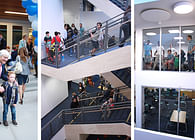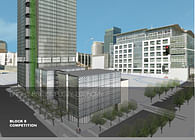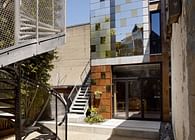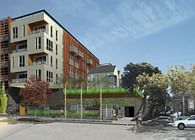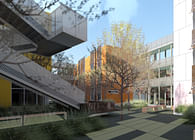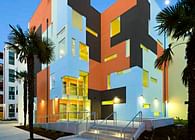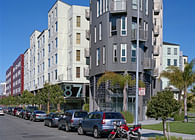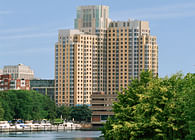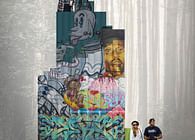
Design Concept: The Sampo
The Sampo is an artifact of Finnish Mythology that brings prosperity to those who possess it. I’ve chosen the Sampo as the metaphor to guide our project. In a more modern context, the museum which is my Sampo, is a gift to the citizens of Helsinki which will bring both physical and cultural prosperity to the city of Helsinki.
Helsinki, of course, is already endowed with fantastic cultural institutions, but as the Sampo is portrayed in the Kalevala, I intend the treat the new Guggenheim Museum as a public utility for its citizens and visitors in a myriad of ways.
Site and Building Planning
I’ve split the building into two wings that slowly rise from ground level to its apex with views facing the Market Square. This can be accessed by the public from ground level and traveled up along a wooden boardwalk. The roof is planted with a birch forest and the boardwalk ambles through opening up at key views along the path.
At ground level the building’s two wings are divided by a path leading to the main entry court. The central court is dotted with seating for the large café and ringed with the trees from the roof above. In full public view, the entire program of the museum can be engaged in from here.
To the south, is the more private wing of the museum which separates the courtyard from the port’s truck road, while to the north is a more transparent public face of the museum facing the harbor.
The Sampo and the Artist
I would like local and international artists to use our museum as their medium.
The birch forest on the museum’s roof is meant to be a source of material that will be periodically and selectively cut by artists for special events. I also hope to cater to Helsinki’s digital art scene by wrapping LED screens over four faces of the museum which provide a canvas on a massive scale to participating artists.
Sustainability and Structure
My design philosophy strives for low embodied energy for the construction and maintenance of the building.
I’ve chosen cross laminated timber (CLT) for our floor and roof structures as well as our primary and secondary framing. To create very long spans in the museum, I have formulated an novel system of seven concrete super-columns that span to a series of whole-tree lathed posts that line the perimeter of the structure. The CLT and whole tree columns combine ancient and modern timber construction while reducing the embodied energy of steel manufacturing and shipping to the site.
The super-columns also provide other services for the museum including snow and water collection, a negative pressure ventilation system in summers, and natural light into the galleries.
Status: Competition Entry
Location: Helsinki, FI
My Role: Designer
Additional Credits: BAR Architects








